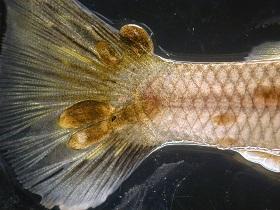Diagnostic Laboratory
Please speak to someone in the diagnostic lab before collecting and packing samples for the lab. Talking to us ahead of time allows us to discuss which specimens would be best, how many we need, and how to package and transport them in the most appropriate way for diagnostics, which may be different than your standard shipping protocols. Contacting us will also ensure that we do not have other cases submitted at the same time and are not out of the office visiting other farms, so we can examine your fish in the timeliest manner.
Debbie Pouder, Diagnostic Lab Manager: 813-671-5230 x106 / dbpouder@ufl.edu
- or -
Roy Yanong, Veterinarian: 813-671-5230 x104 / rpy@ufl.edu
![]() Client History Form for Ornamentals
Client History Form for Ornamentals
![]() Client History Form for Foodfish, Sportfish, Stock Enhancement
Client History Form for Foodfish, Sportfish, Stock Enhancement
![]() Sample Submission Form for Veterinarians and Other Clinicians
Sample Submission Form for Veterinarians and Other Clinicians
In addition to a good representative sample of sick fish (see How to Collect and Prepare Samples), the laboratory staff needs a thorough history of the fish, system, and problem in order to make the best recommendations for treatment and prevention.
 Not all diseases are infectious (caused by parasites, bacteria, viruses, or fungi). Many diseases are non-infectious (caused by environmental, nutritional, or genetic problems). Fish usually become sick or die because of a combination of factors, so addressing only one factor (e.g., presence of a parasite) may not solve the current problem or prevent additional problems in the future. Some primary causes of disease, such as poor water quality, may not be recognized if only the fish are examined. The initiating cause of a disease problem may have occurred weeks or even months before fish began showing clinical signs.
Not all diseases are infectious (caused by parasites, bacteria, viruses, or fungi). Many diseases are non-infectious (caused by environmental, nutritional, or genetic problems). Fish usually become sick or die because of a combination of factors, so addressing only one factor (e.g., presence of a parasite) may not solve the current problem or prevent additional problems in the future. Some primary causes of disease, such as poor water quality, may not be recognized if only the fish are examined. The initiating cause of a disease problem may have occurred weeks or even months before fish began showing clinical signs.
Important details such as stocking densities, water quality information, system set up, nutrition, number of sick and/or dying fish, and previous treatment information help to fill in different pieces of the puzzle.
When submitting fish and/or water to the Diagnostic Lab for evaluation, please fill out the appropriate Client History Form and submit it with the sample. If you are an ornamental fish producer, wholesaler, or retailer, please fill out the Client History Form for Ornamentals. If you are a foodfish or sportfish producer or a stock enhancement facility, please fill out the Client History Form for Foodfish, Sportfish, Stock Enhancement. (Veterinarians and other clinicians should fill out the Sample Submission Form for Veterinarians and Other Clinicians instead of a Client History Form.) Please fill out the form completely. The Laboratory cannot provide a diagnosis without a thorough history. Complete a separate form for each batch of fish being submitted. Answer questions only as they pertain to the current problem and the batch of fish being submitted, except as appropriate in the “Previous Problems” section. Please label fish and/or water sample bags with business name, contact name, phone number, fish species, and unit (vat/tank/pond) number or identifier.
As with any veterinary practice, the Tropical Aquaculture Laboratory adheres to a strict policy of client confidentiality.
